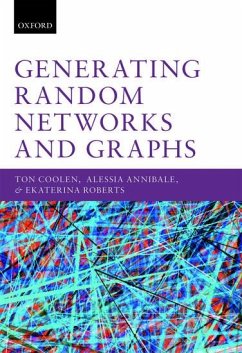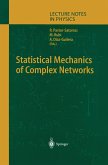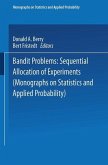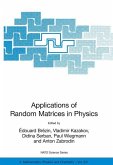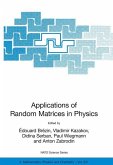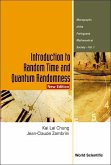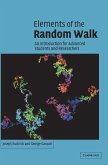Ton Coolen
Generating Random Networks and Graphs
Ton Coolen
Generating Random Networks and Graphs
- Gebundenes Buch
- Merkliste
- Auf die Merkliste
- Bewerten Bewerten
- Teilen
- Produkt teilen
- Produkterinnerung
- Produkterinnerung
This book describes how to correctly and efficiently generate random networks based on certain constraints. Being able to test a hypothesis against a properly specified control case is at the heart of the 'scientific method'.
Andere Kunden interessierten sich auch für
![Dynamical Groups and Spectrum Generating Algebras (in 2 Volumes) Dynamical Groups and Spectrum Generating Algebras (in 2 Volumes)]() Arno BohmDynamical Groups and Spectrum Generating Algebras (in 2 Volumes)337,99 €
Arno BohmDynamical Groups and Spectrum Generating Algebras (in 2 Volumes)337,99 €![Statistical Mechanics of Complex Networks Statistical Mechanics of Complex Networks]() Statistical Mechanics of Complex Networks39,99 €
Statistical Mechanics of Complex Networks39,99 €![Bandit problems Bandit problems]() Donald A. BerryBandit problems84,99 €
Donald A. BerryBandit problems84,99 €![Applications of Random Matrices in Physics Applications of Random Matrices in Physics]() Edouard Brezin / Vladimir Kazakov / Didina Serban / Paul Wiegmann / Anton Zabrodin (eds.)Applications of Random Matrices in Physics112,99 €
Edouard Brezin / Vladimir Kazakov / Didina Serban / Paul Wiegmann / Anton Zabrodin (eds.)Applications of Random Matrices in Physics112,99 €![Applications of Random Matrices in Physics Applications of Random Matrices in Physics]() Edouard Brezin / Vladimir Kazakov / Didina Serban / Paul Wiegmann / Anton Zabrodin (eds.)Applications of Random Matrices in Physics112,99 €
Edouard Brezin / Vladimir Kazakov / Didina Serban / Paul Wiegmann / Anton Zabrodin (eds.)Applications of Random Matrices in Physics112,99 €![Introduction to Random Time and Quantum Randomness Introduction to Random Time and Quantum Randomness]() Kai Lai ChungIntroduction to Random Time and Quantum Randomness110,99 €
Kai Lai ChungIntroduction to Random Time and Quantum Randomness110,99 €![Elements of the Random Walk Elements of the Random Walk]() Joseph RudnickElements of the Random Walk99,99 €
Joseph RudnickElements of the Random Walk99,99 €-
-
-
This book describes how to correctly and efficiently generate random networks based on certain constraints. Being able to test a hypothesis against a properly specified control case is at the heart of the 'scientific method'.
Produktdetails
- Produktdetails
- Verlag: Oxford University Press (UK)
- Seitenzahl: 324
- Erscheinungstermin: 23. Mai 2017
- Englisch
- Abmessung: 249mm x 173mm x 23mm
- Gewicht: 794g
- ISBN-13: 9780198709893
- ISBN-10: 0198709897
- Artikelnr.: 47856777
- Herstellerkennzeichnung
- Libri GmbH
- Europaallee 1
- 36244 Bad Hersfeld
- gpsr@libri.de
- Verlag: Oxford University Press (UK)
- Seitenzahl: 324
- Erscheinungstermin: 23. Mai 2017
- Englisch
- Abmessung: 249mm x 173mm x 23mm
- Gewicht: 794g
- ISBN-13: 9780198709893
- ISBN-10: 0198709897
- Artikelnr.: 47856777
- Herstellerkennzeichnung
- Libri GmbH
- Europaallee 1
- 36244 Bad Hersfeld
- gpsr@libri.de
Ton Coolen received his PhD in Theoretical Physics from the University of Utrecht, followed by postdoctoral work at Utrecht, Nijmegen and Oxford. Since 1995 he has been working at King's College London. During this time he had developed a special interest in multidisciplinary research. This is expressed firstly through applying his expertise in statistical mechanics to problems including medical survival analysis, cellular signalling networks, econophysics and immunology. He also set up the Institute for Mathematical and Molecular Biomedicine in order to bring together colleagues in biology, medicine, physics, computer science and mathematics to work on developing effective quantitative tools for biomedical researchers. Alessia Annibale obtained her undergraduate and Master degrees from the University of Rome "La Sapienza" before moving to the Disordered System and Neural Networks group in King's College London to complete her PhD. She has continued to work as a lecturer in King's College London, with papers published on spin glasses, network dynamics and stochastic processes on finitely connected random graphs. She is a member of the Institute for Mathematical and Molecular Biomedicine, and in recent years has taken a particular interest in applying the mathematical tools of disordered systems to understand the properties of biological networks. Ekaterina Roberts obtained her undergraduate degree from Imperial College, London. After this she worked at the UK's Financial Services Authority, contributing to regulatory policies on how financial institutions should measure and capitalise their credit risk, as well as undertaking direct supervisory oversight of some small banks and insurers. She then joined the Randall Division of Cell and Molecular Biophysics to complete a cross-disciplinary PhD which used statistical mechanics to create tools to analyse random graph ensembles which share topological properties with real molecular networks.
1: Introduction
2: Definitions and concepts
3: Random graph ensembles
4: Soft constraints: exponential random graph models
5: Ensembles with hard constraints
6: Markov Chain Monte Carlo sampling of graphs
7: Graphs with hard constraints: further applications and extensions
8: Network growth algorithms
9: Specific constructions
10: Graphs on structured spaces
11: Application of random graphs
2: Definitions and concepts
3: Random graph ensembles
4: Soft constraints: exponential random graph models
5: Ensembles with hard constraints
6: Markov Chain Monte Carlo sampling of graphs
7: Graphs with hard constraints: further applications and extensions
8: Network growth algorithms
9: Specific constructions
10: Graphs on structured spaces
11: Application of random graphs
1: Introduction
2: Definitions and concepts
3: Random graph ensembles
4: Soft constraints: exponential random graph models
5: Ensembles with hard constraints
6: Markov Chain Monte Carlo sampling of graphs
7: Graphs with hard constraints: further applications and extensions
8: Network growth algorithms
9: Specific constructions
10: Graphs on structured spaces
11: Application of random graphs
2: Definitions and concepts
3: Random graph ensembles
4: Soft constraints: exponential random graph models
5: Ensembles with hard constraints
6: Markov Chain Monte Carlo sampling of graphs
7: Graphs with hard constraints: further applications and extensions
8: Network growth algorithms
9: Specific constructions
10: Graphs on structured spaces
11: Application of random graphs

